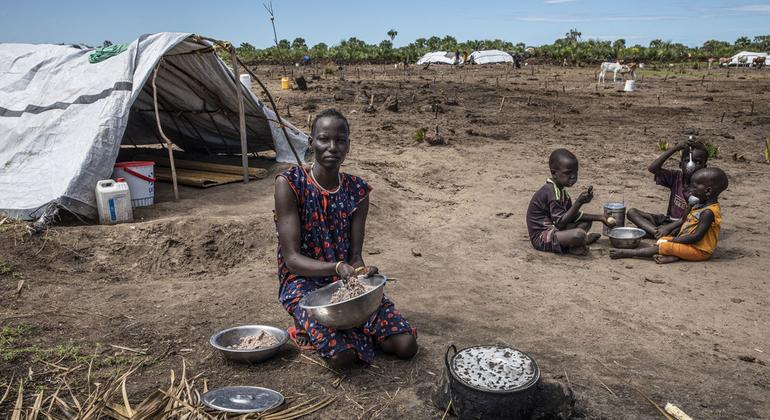The world is on its way to “a raging food catastrophe”, Secretary-General António Guterres warned leaders gathered in Bali, alerting them that “people in five separate places are facing famine”.
“Simultaneously, we are witnessing a crunch in the global fertilizer market”, he continued, highlighting once again the Black Sea Grain Initiative to export vital food supplies from Ukraine, and fertilizers from Russia.
Food and energy session
Speaking at the special session on the food and energy crisis, Mr. Guterres credited the European Union, United States, United Kingdom and others, for cooperating successfully with the UN to remove many of the obstacles preventing the free flow of Russian food and fertilizers to global markets.
He informed the participants that the first shipment of Russian fertilizers – donated by Uralkem and managed by the World Food Programme (WFP) – will be loaded up in the Netherlands on Tuesday.
“Food and fertilizers are not subject to sanctions, but suffer indirect impacts”, explained the UN chief. We are working nonstop to resolve all remaining issues, chiefly around payments, and to renew the Black Sea Grain Initiative”.
“I count on all of your to support these efforts”.
Step up financing
Many governments in the Global South, battered by the COVID-19 pandemic, unequal resources for recovery, and the climate crisis, lack the fiscal space to help their people deal with rising food and fertilizer prices accelerated by the war, the top UN official said.
He reminded that his call for a Sustainable Development Goals (SDG) Stimulus aimed to provide those countries with adequate liquidity by reallocating supplementary foreign exchange reserve assets called Special Drawing Rights; concessional financing to Middle Income Countries in distress; and effective mechanisms of debt relief and restructuring.
“Transformational investments in agriculture, particularly in Africa, are essential to prevent future crises”, he asserted. “But they need the resources, to be implemented”.
Environmental woes
The climate crisis is another factor pushing people into hunger, according to the UN chief.
“Changing weather patterns, droughts and storms are disrupting crop cycles and fisheries”, he told the G20, pointing out that “80 per cent of global emissions are sitting around this table”.
Mr. Guterres argued that a Climate Solidarity Pact between developed countries and large emerging economies is the only way to defeat climate change.
“Developed countries must take the lead in reducing emissions”, he instructed.
“They must also mobilize, together with international financial institutions and technology companies, to provide financial and technical support so that large emerging economies can accelerate their transition to renewables”.
Just energy transition partnerships are an important first step to this end.

In a low-income settlement on the outskirts of Colombo, some parents in Sri Lanka frequently skip meals as means of grappling with the rising cost of food and living.
Prevent ‘energy scramble’
As many developing countries cannot afford soaring energy prices, the top UN official warned against “an energy scramble” in which developing countries “come off worst” – as they did in the competition for COVID-19 vaccines.
Moreover, doubling down on fossil fuels is no solution.
“If, in the last two decades, the world had massively invested in renewable energy, rather than its addiction to fossil fuels, we would not be facing the present crisis”, he said.
Working as one for the good of all
In closing, the Secretary-General advocated for “unity, solidarity and multilateral solutions” to address the food and energy crises, and to “eliminate the trust deficit” that is undermining global action across the board.
“Multilateral solutions can only be built on fairness and justice”, he said.
“I urge G20 countries to consider these fundamentals in your decisions”.
xx



